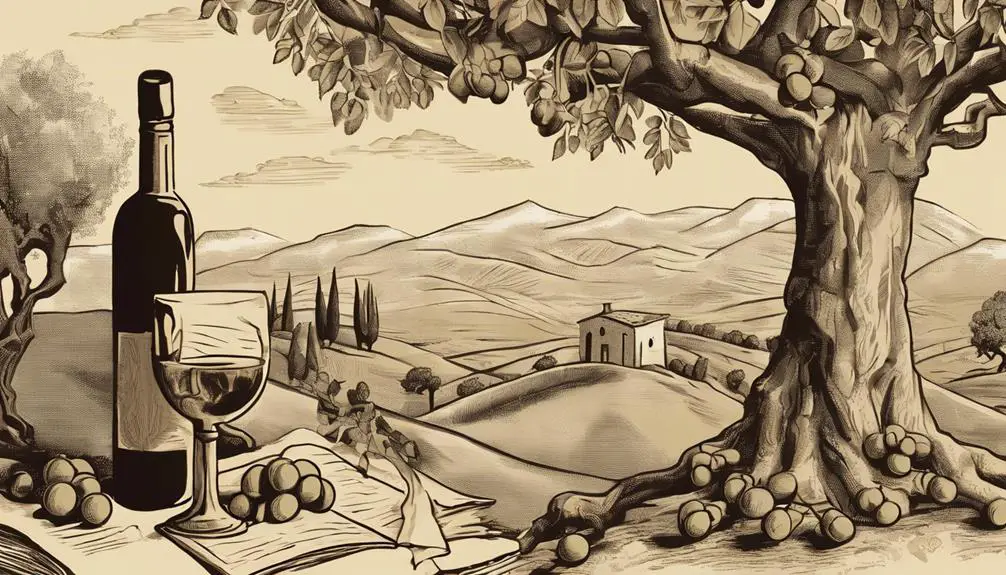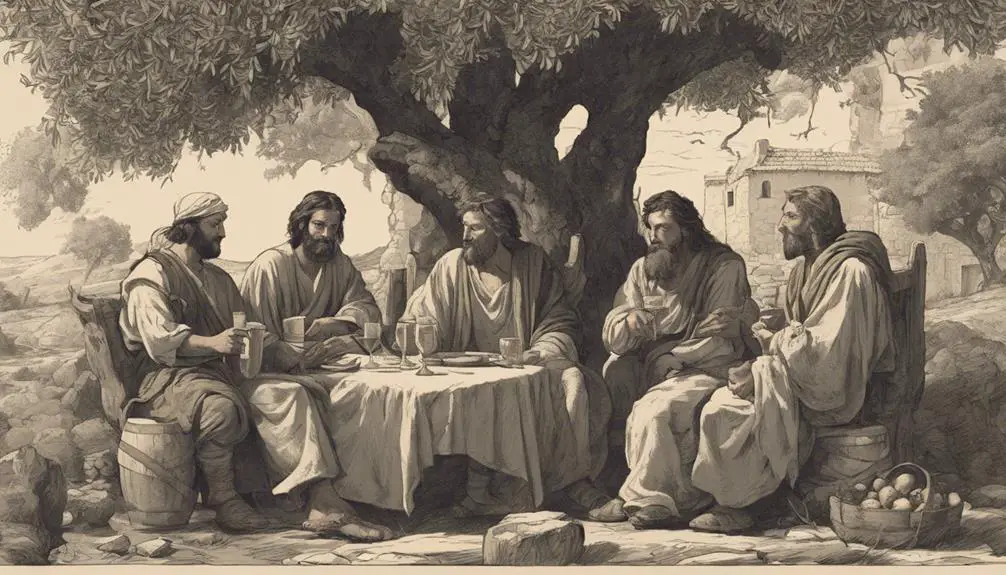Analyze the Bible's diverse viewpoints on alcohol consumption, unraveling contradictions and exploring its calls for moderation and blessings.

What Does the Bible Say About Alcohol Verses
While you may think the Bible strictly condemns all alcohol consumption, it's not so black and white. The scriptures present a nuanced view, sometimes even seeming contradictory. From Old Testament to New, verses vary, with some admonishing excessive drinking, others depicting wine as a blessing.
What does this mean for your understanding of moderation and indulgence in a biblical context? Let's unpack this together, ensuring you're well-equipped for an informed perspective on this intriguing topic.
Key Takeaways
- The Bible portrays wine as a culturally significant element, often symbolizing spiritual truths in various parables.
- Both Old and New Testaments warn against excessive consumption of alcohol, emphasizing moderation and responsibility.
- The Bible uses characters like Noah and Lot to demonstrate the negative consequences of alcohol misuse.
- Context and intentionality are crucial in the biblical perspective of alcohol consumption, supporting responsible and joyous use.
Old Testament Perspectives on Alcohol

Delving into the Old Testament, you'll find a nuanced perspective on alcohol that both acknowledges its potential for abuse and recognizes its place in societal and religious practices. It's important not to overlook the cultural context of the times in which these texts were written. Wine was often safer to consume than water, due to the lack of purification methods, and it played a significant role in feasts and ceremonies.
Numerous passages caution against overindulgence (Proverbs 20:1, for instance, warns that 'wine is a mocker, strong drink a brawler'). Yet, there's also a positive light shed on moderate consumption. Deuteronomy 14:26 even encourages the use of wine and strong drink in celebration of the Lord. An important distinction here is the difference between use and misuse. The Old Testament doesn't outright condemn drinking, but it repeatedly warns against drunkenness.
In your study, you'll discover the Old Testament's approach isn't simplistic or moralistic; rather, it's characteristically wise and balanced. Drinking isn't labeled as inherently evil, but caution is advised due its potential to lead astray. This serves as a precursor to the New Testament's teachings, further deepening our understanding of biblical perspectives on alcohol.
New Testament References to Drinking

Transitioning to the New Testament, you'll encounter a more layered discussion on alcohol, which further underscores the importance of moderation and responsible drinking. While the Old Testament often portrays wine as a blessing, the New Testament, you'll find, brings in additional dimensions to consider.
Here, let's take a look at some key verses:
Reference |
Description |
|---|---|
Ephesians 5:18 |
Paul advises against drunkenness, suggesting that being filled with the Spirit is a better alternative. |
1 Timothy 5:23 |
Paul suggests that Timothy use a little wine for his stomach's sake, indicating medicinal use of alcohol. |
Romans 14:21 |
Paul advises that it is good not to drink wine or anything that causes your brother to stumble, highlighting sensitivity to others. |
Luke 7:33-34 |
Jesus was accused of being a drunkard, showing societal perceptions of drinking. |
1 Corinthians 6:10 |
Drunkards are listed among those who won't inherit the kingdom of God, emphasizing the dangers of excessive drinking. |
These verses show that the New Testament acknowledges the social and medicinal uses of alcohol but strongly cautions against misuse and excess, always advocating for responsibility and care for others.
Parables Involving Wine

Turning our attention to the parables, you'll find that wine often plays a significant role, serving as a metaphor for various spiritual truths. For instance, in the parable of the wineskins in Matthew 9:17, wine signifies the New Covenant—Jesus' teachings—that couldn't be contained in the old wineskins, representing the old Jewish laws.
Next, you'll encounter the parable of the vineyard workers in Matthew 20:1-16. Here, the vineyard is the Kingdom of Heaven and the wine produced represents the fruits of spiritual labor. The parable doesn't directly involve wine, but it's implied through the process of wine production.
Lastly, in Luke 5:39, a parable states that no one after drinking old wine desires new. Interpreted, this suggests that those accustomed to old ways are resistant to new teachings, symbolized by the new wine.
In each instance, wine is a powerful metaphor, conveying complex spiritual concepts. It's not merely about the physical act of drinking, but the broader, deeper implications that wine carries in the biblical narrative. Remember, these parables aren't advocating for or against alcohol consumption—they're using wine as a vehicle to deliver profound spiritual messages.
Biblical Characters and Alcohol

Shifting our focus from parables to actual figures in the Bible, let's consider the relationship between biblical characters and alcohol, examining their behaviors, attitudes, and responses to its consumption.
Noah, one of the earliest characters to interact with alcohol, serves as a warning tale. After surviving the flood, he plants a vineyard and becomes drunk, leading to disgrace and familial discord.
Lot, another biblical figure, also had a problematic relationship with alcohol. His daughters use wine to make him drunk and engage in incestuous acts, resulting in severe consequences. These tales show you the destructive potential of alcohol when misused.
On the other hand, Melchizedek, King of Salem, presents wine as a symbol of blessing and fellowship when he offers it to Abraham. Jesus himself uses wine at the Last Supper to represent his blood, signifying a new covenant.
Through these characters, you can see a nuanced portrayal of alcohol in the Bible. It's neither wholly condemned nor unconditionally praised, but its consumption is contingent upon the context, manner, and intention. This suggests a balanced perspective, hinting at moderation without explicitly stating it.
Moderate Drinking: A Biblical View

In examining the Bible's perspective on moderate drinking, you'll find it leans towards an approach of careful balance and thoughtful consumption. It neither promotes nor totally bans alcohol consumption, but it does caution against excessive drinking. For instance, in Proverbs 20:1, it's stated, 'Wine is a mocker, strong drink is raging: and whosoever is deceived thereby isn't wise.' This suggests that alcohol can cloud judgement, leading to unwise actions.
In 1 Timothy 5:23, Paul suggests to Timothy to drink a little wine for health purposes. This shows that moderate drinking, particularly for health reasons, isn't entirely forbidden. Similarly, in Ecclesiastes 9:7, there's an encouragement to 'drink your wine with a merry heart.' This could be interpreted as support for responsible, joyous consumption.
However, Ephesians 5:18 warns, 'Do not get drunk on wine, which leads to debauchery.' This illustrates the Bible's clear stance against drunkenness and the potential immorality it can lead to. As such, the Bible's view on moderate drinking seems to be one of balance: enjoy but don't overindulge, and always exercise discernment and self-control.
Conclusion
In conclusion, the Bible offers a nuanced view on alcohol. From Old Testament to New, it neither fully condemns nor glorifies drinking. While some Biblical characters are depicted with alcohol, it's clear that moderation is key.
The parables involving wine highlight its cultural significance, yet warn against excess. Ultimately, the Bible calls for wisdom and discernment in its use, emphasizing the importance of personal responsibility and self-restraint.



Sign up